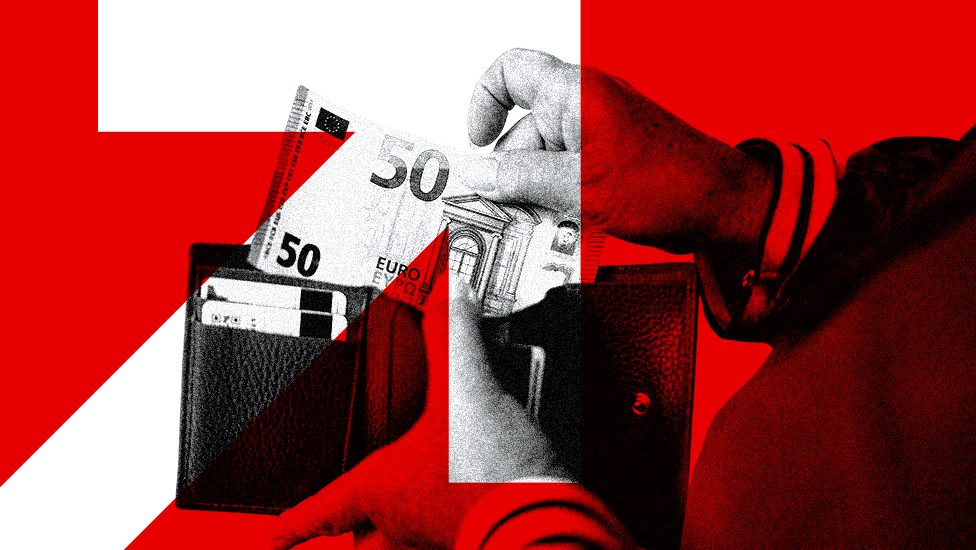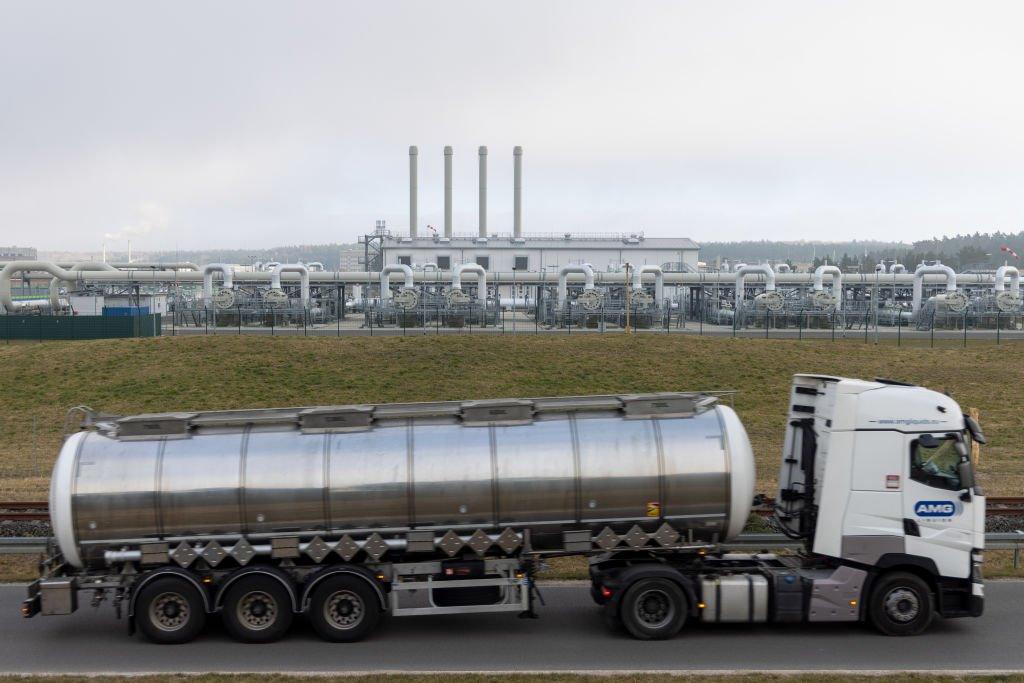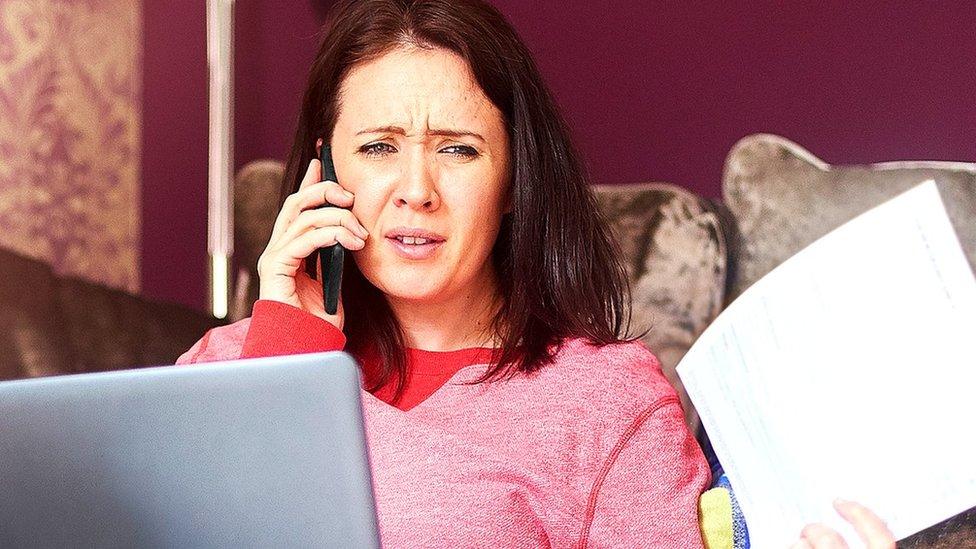Which countries are doing the most to tackle energy bills?
- Published

Energy bills have been rising for households across Europe as prices have been driven up by worries about gas and oil supplies after Russia's invasion of Ukraine.
Individual countries, and the European Union (EU), have announced support schemes for consumers.
Here's what they're doing:
The EU
In 2021, the EU imported 40% of its gas from Russia - so many of its member states are exposed to high energy prices.
In response, the EU is introducing:
A cap on gas prices if they exceed €180 per megawatt hour for three days running, from February 2022.
A "solidarity levy" - a windfall tax - on excess profits made by oil, gas, coal and refinery companies in 2022.
A cap on the revenues of electricity companies which produce energy from wind, solar and nuclear. These revenues have risen as the price of electricity from these sources is linked to soaring gas prices - the cap is expected to raise €140 billion (£121bn).
A mandatory reduction of electricity consumption in peak hours by 5% across the EU, until March 2023.
A voluntary reduction of 10% of overall electricity consumption - individual countries will decide how to to this.
Germany
In October, the German parliament approved a "defensive shield" package worth €200bn (£175bn).
It includes a cap on gas and electricity prices for households and some businesses from early next year.
The government will pay December's monthly gas bill for all households and small-to-medium businesses.
In September and October, all taxpayers received a one-off energy payment €300. There has been extra help for people on benefits.
Public transport tickets are being subsidised.
Germany is trying to cut energy consumption, external by:
Heating public buildings to a maximum of 19C, with exceptions for places like hospitals
Turning off hot water for washing hands in public buildings
Lighting limits for buildings, monuments and advertising
A windfall tax on energy companies will be applied from December 2022 to the end of June 2023.
France
In January, the government forced the state-owned energy provider, Électricité de France (EDF), to cap price rises at 4% for a year.
It says it will cap rises in gas and electricity at 15% for 2023, as part of a €45bn (£39bn) scheme to support households and businesses.
France had already announced a one-off €100 (£84) payment last year to 5.8 million households receiving energy vouchers.
The government plans to reduce energy consumption by 10% by:
Capping indoor temperatures at 19C for public buildings
Cutting the temperature of public sports facilities by 2C and in public swimming pools by 1C
Paying civil servants an extra €2.88 per day to work from home, if this allows government buildings to close
Speed limits on ski lifts and producing less artificial snow
The government is planning a windfall tax on energy companies in the 2023 budget.

France is cutting the temperature in public swimming polls by 1C
Italy
Italy is expecting to spend about €49.5bn (£42bn).
Its measures include a €200 (£169) one-off payment to people earning €35,000 (£29,600) a year or less, and a 20% tax credit for all energy-intensive companies experiencing a 30% rise in prices.
The Italian government is also trying to reduce gas consumption by:
Asking people to turn central heating down by 1C and turn it off for an extra hour every day
Limiting heating in public buildings, with exceptions for hospitals, nurseries and some industries
The government is planning a windfall tax on energy companies in 2023.
Netherlands
Since November, electricity and gas prices for households have been capped at January 2022 levels - up to a certain amount of consumption. Any extra use will be charged at market rates.
The government is also offering a discount of €190 on energy bills in November and December to all households.
There is a one-off energy allowance of €1,300 to those on lower incomes.
VAT on energy bills and tax on petrol and diesel have also been cut.
The Dutch government is also introducing:
a higher minimum wage
lower income tax
higher benefits and allowances (such as child benefit, student grants and tax credits)
It is expecting to spend €15.5bn (£13.5bn) on these measures.
The Dutch government is advising households and business, external to cut consumption, including by turning down heating by 1C.
The government is planning a windfall tax on energy companies.

Spain
Spain has cut VAT on energy bills and reduced tax on electricity.
Spain and Portugal have introduced a price cap for gas - which will last for one year and aims to halve gas bills for 40% of customers in the two countries.
There is also a one-off payment of €200 euros for people in Spain who earn less than €14,000 a year and are not already receiving benefits.
Spain's measures are expected to cost about €27bn (£23bn).
The government has an energy-saving plan which includes limiting air conditioning in public buildings and shops in the summer and keeping heating to 19C in the winter.
It wants shops to close their doors when the heating is on and says they should switch off lights after 22:00.
The government is introducing a windfall tax on energy companies and banks over the next two years.

Poland
It has announced plans for an energy price support package for households, worth 26.8bn zlotys (£4.8bn).
It incudes freezing energy prices for 2023 at this year's level, with a limit of 2,000 kWh per year for most households.
There will be higher thresholds for households with people with disabilities and for families with three or more children.
The government has abolished VAT on food, gas and fertilizer and reduced it on petrol, diesel and energy bills.
There is also a new mandatory 10% electricity saving for national and local government public administrations.
Households that reduce electricity use by 10% in 2023 compared with 2022, will be rewarded with an additional discount.
Norway
Norway has set a maximum price that households should pay for their energy - anything over this, the government will pay 80% of the bill.
A new package of loans and subsidies for businesses was announced in September. This will cover companies that spend more than 3% of revenue on power costs.
The government has also proposed new taxes on onshore wind and hydropower energy, to redistribute some of the huge increase in profits over the past year.

UK
The UK government has brought in a cap on the price of a unit of energy until April 2023, which will mean the typical household bill for gas and electricity will be £2,500 a year.
This is being extended to April 2024, but typical bills will be capped at £3,000 a year.
There will be more support for those on benefits and for pensions households.
The government brought in a windfall tax on UK oil and gas firms' profits which is expected to raise £5bn a year. This is being increased and extended.
Previously, the government introduced an energy bill discount of £400 for every household with some extra support for people on benefits.
The UK government launched a public information campaign on how to save energy in November, which was later than other countries in Europe.
